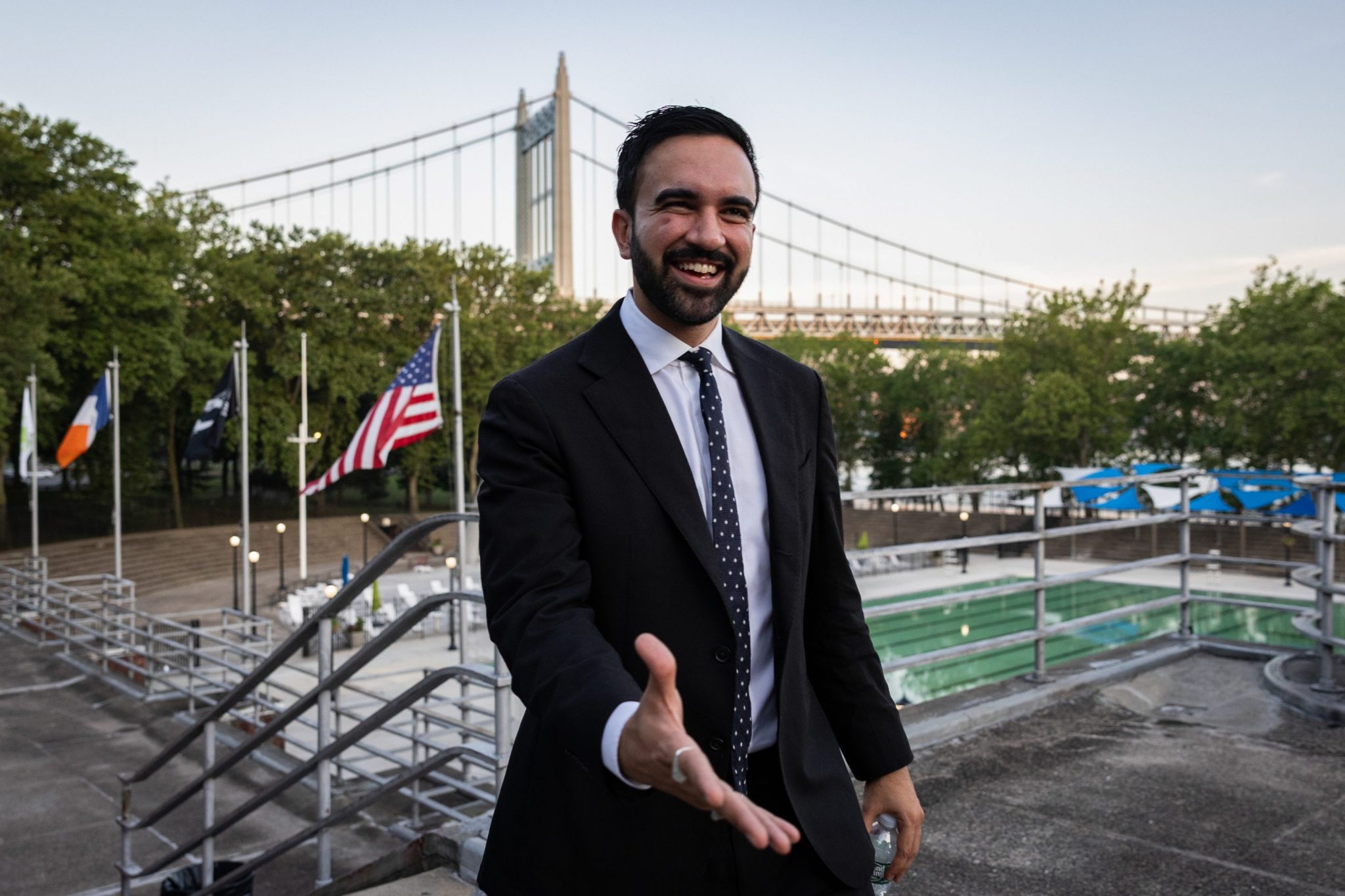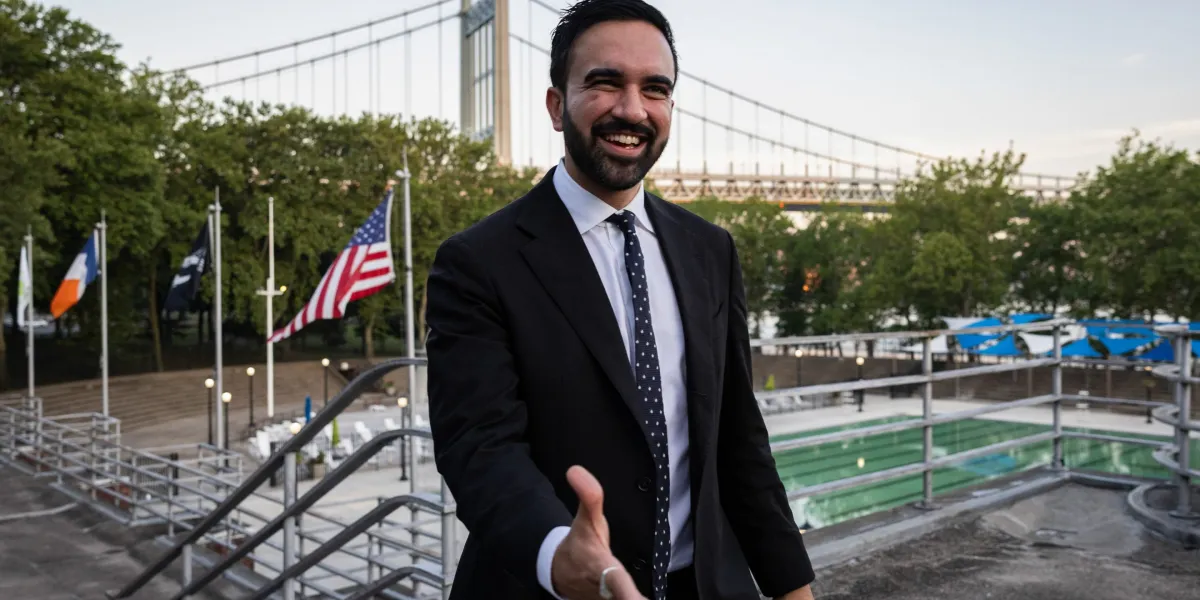
The wealthy in New York City are on the move, spurred by what some are calling the “Mamdani Effect”—a sudden surge of outward migration in anticipation of Zohran Mamdani, a democratic socialist, likely taking the reins as mayor this November.
As polls point ever more decisively to a Mamdani victory in the fast-approaching Nov. 4 election, Manhattan’s elite are quietly packing their bags and setting their sights on the rolling lawns and leafy streets of Westchester County as well as other suburban enclaves.
Real estate agents in Westchester, directly north of the city’s border, say the torrent began shortly after Mamdani’s surprise win in the Democratic primary this June. Zach and Heather Harrison, who represent The Harrison Team at Compass, told Realtor.com they’ve experienced “a spike in Manhattan residents reaching out about suburban properties.” Nearly every city-based buyer they’ve shown homes to in Westchester since summer has brought up the mayoral race as a prime factor driving their suburban search.
Since Mamdani seized the primary, home sales entering contract in Westchester County have jumped 15% compared with last year, according to Harrison data. Local agents now speak freely of the “Mamdani effect,” a shorthand for the collective anxiety—and strategic thinking—rippling through affluent New Yorkers who fear the prospect of increased taxes and sweeping socialist housing reforms.
Manhattan realtors are feeling the heat, too. Alexandra Carter, a licensed real estate salesperson with the Corcoran Group in Manhattan, told Fortune that the reaction to Mamdani’s surprise primary win has been unlike anything witnessed in recent memory.
“I have never seen this type of reaction to a mayor,” she said. “It’s been pretty drastic, after he won the primary we had a companywide call on implications for business because of the ‘rent freezes.’” Describing the Mamdani effect, she said “people are afraid it will be bad for business.”
Mamdani’s campaign did not respond to requests for comment.
Policies ignite an exodus
Mamdani’s proposed housing plan is ambitious—and, for many high earners, unsettling. The centerpiece is a $100 billion investment over 10 years to construct 200,000 new publicly subsidized, rent-stabilized apartments. He also vows to freeze rents on stabilized units citywide for multiple years and double the capital budget for the city’s public housing authority. Another plank would “fast-track” approval for any project that is 100% affordable housing, cutting through bureaucratic delays that have traditionally slowed such developments.
To foot the bill, Mamdani plans a new 2% tax targeting New Yorkers earning more than $1 million annually—a move his campaign says could generate $4 billion per year for early child care, public housing, and more. While working-class and immigrant communities hail these policies as overdue relief, higher earners are calculating their exit strategies.
Taxes are the number one priority, said Zach Harrison. New York City’s local resident income tax already ranges from 3.078% to 3.876%, layered atop state and federal burdens. “One of the great things about Westchester County is that, unlike in the city, nearly all of our towns (with the exception of Yonkers) have no resident income tax,” Harrison notes.
John Boyd, whose corporate site-selection business serves clients in both New York and South Florida, told Fortune that he could see Mamdani’s election kickstarting a “second wave of relocations and wealth migration,” with the first wave being the flight from New York to Florida that took place during the pandemic.
He said his clients are “paying close attention” to the New York mayoral race, noting data that shows hundreds of New Yorkers switching driver licenses to Miami-Dade County. The first half of 2025 saw a 33% surge in New York licenses converting, per Miami Realtors.
Boyd said Westchester is well positioned, as are other regional markets like Jersey City across the Hudson River as well as Nassau and Suffolk Counties on Long Island, to benefit from the “Mamdani effect” and attract new businesses and people.
“I was talking about this the other day with a client of ours — for some NYC companies Mamdani will be the final straw and they will relocate to South Florida or Dallas or Nashville — but for many others they will seek a regional alternative,” he recalled.
Beyond the suburbs of New York and New Jersey, he sees markets like Miami and Dallas benefitting, too. “It’s not just the taxes and the regulations and concerns about quality of life in New York,” he told Fortune, “but a sense that many of our clients had that they weren’t getting a good return on their tax dollar. The prospect of a Mamdani mayoralty is bringing back a lot of those memories.”
Carter said much of what she sees of the Mamdani Effect is how heavily taxed New Yorkers are already, noting that wealthy New Yorkers have been known to split their time in Florida for tax reasons. She said she’s heard of people moving, while there’s another subset of people who are going to see how the election turns out. She said one client sold his mother’s apartment over the summer and has been waiting “to see if he wants to reinvest in NYC.”
Even if Mamdani does not enact any policy that is remotely quasi-socialist, his reputation is preceding him with the federal government, which has made ominous noises about its future relationship with the country’s largest city. President Donald Trump has repeatedly threatened to withhold federal funding from Mamdani (while conceding that it “looks like he’s going to win”), and Treasury Secretary Scott Bessent said that he would repeat a famous phrase if Mamdani ruins municipal finances and seeks help: drop dead.
Will the exodus become a flood?
Suburban living, it should be noted, is hardly cheap. Westchester’s median home list price hit $729,999 in August—far above the national median of $429,990. And median household incomes in Westchester overall exceed New York state and national averages. The county is home to some of the richest zip codes in the U.S., including its single wealthiest suburb, Scarsdale.
While income taxes in Westchester are lower than those in New York City, the county has some of the highest property taxes in the country, money that helps fund Westchester’s competitive public schools and public amenities.
Some commentators, especially conservative ones, warn of a full-blown exodus. Fox News host Sean Hannity, a former New Yorker now based in Florida, famously said on air, “If they want to go with Mamdani as the mayor of New York City, I invite you all to come and broadcast your show as I do, originate your show in the free state of Florida. Because there is going to be a mass exodus out of the state of New York, the likes of which we have never seen.”
Still, despite the headlines (and articles like this one), New York City’s housing market continues to show surprising resilience. Home prices slipped 1.2% nationwide in August, but New York’s edged up 0.3% month-over-month, per Realtor.com data. Nationally, homes are sitting longer on the market, but New York homes averaged 58 days compared to the national 60-day average.
Carter said Mamdani might be campaigning on a very progressive platform, but there are going to be limits on what he actually accomplish. “Freezing rent and turning NYC socialist overnight will not happen.”
As for herself, she won’t be one of the people leaving New York, telling Fortune that she, her husband and her two young boys have moved to a townhouse in the Park Slope section of Brooklyn.
“We definitely are not going anywhere—we love it.” There’s just a lot of bad vibes, she added. “I do think people are genuinely scared of the unknown.”















